National AgrAbility Project
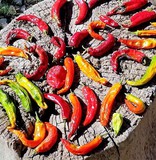 Albuquerque, New Mexico, served as the backdrop for a Regional Training Workshop November 8-9. As this event was being planned, New Mexico did not have a state AgrAbility project. However, they were recently awarded an AgrAbility grant.
Albuquerque, New Mexico, served as the backdrop for a Regional Training Workshop November 8-9. As this event was being planned, New Mexico did not have a state AgrAbility project. However, they were recently awarded an AgrAbility grant.
A group of 40-plus professionals in occupational therapy, physical therapy, assistive technology, vocational rehabilitation and social work, gathered to network and learn about AgrAbility, the link between OT and AgrAbility, lighting, adaptive tools and technology, and urban and microscale farming.
A day of conference sessions was followed by tours of Mandy's Farm and the Gutierrez-Hubbell House. Mandy's Farm serves individuals with intellectual and developmental disabilities, providing opportunities for gardening, animal care, therapeutic riding, and affiliated business enterprises such as marketing garden goods, alpaca wool, and manure. Mandy's Farm will be a nonprofit partner in the New Mexico AgrAbility Project. The Gutierrez-Hubble House is a joint venture between Bernalillo County Open Space and Hubbell House Alliance. Using reclaimed lands in the city, individuals apply for a training program in which they learn how to work the land and grow appropriate crops. Graduates are able to take on a plot in their second year, developing their own business enterprise. Many participants in the program are coming from incarceration, drug treatment, social services, or other programs.
The session provided 13 contact hours for New Mexico occupational and physical therapists. Many were excited to earn continuing education credits while exploring something that was new to most of them.
AgrAbility will be represented at STAND (Stakeholders Team Up for Action in New York Dairy), a whole-system-in-the-room (WSR) workshop that intends to catalyze a productive collaboration of New York's dairy farmers and supporting industries in order to improve the well being of farmers. The WSR is being coordinated by the Northeast Center for Occupational Safety and Health and New York FarmNet, along with partners from Community Memorial Hospital and Sowing the Seeds of Hope, and is sponsored by the Northeast Center's Emerging Issues program.
The event will be held December 10-12. Look for staff to share what they learn, and explore how it may apply in your region following the workshop.
2-1-1 ... three simple numbers connecting millions of callers to help. 2-1-1 is a free and confidential service that helps people across the U.S. and in many parts of Canada find the local resources they need. Covering the majority of all 50 U.S. states, this is an important number for your clients to have and for AgrAbility services to be listed with.
A call to 2-1-1 can connect individuals to resources for many of their needs. As mental health concerns are on the rise, please know that 2-1-1 contact centers across the country can directly connect individuals to a crisis line, or in some cases, the 2-1-1 contact center IS the crisis hotline for the region. In addition to serving those having a significant mental health situation, 2-1-1 provides connection to valuable resources for food, clothing, shelter, and services.
As each center is credentialed by the Accredited Information and Referral Systems (AIRS) organization, they are required to validate information about programs and services annually. Please respond to correspondence from your local 2-1-1 centers to ensure that your SRAP is correctly represented. We know this can be painful, as many centers cover a few counties in your territory, creating the need for duplicate confirmations, but the effort is worth it!
Submitted by Goodwill of the Finger Lakes
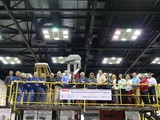
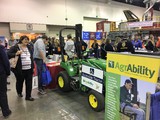 The National AgrAbility Project was one of eight health and safety organizations to exhibit in the CareerSafe/SAY (Safety in Agriculture for Youth) booth at the 2018 National FFA Convention in Indianapolis, Indiana. The NAP display included AgrAbility publications, health and safety materials, and a John Deere tractor with a Life Essentials lift. Sierra Royster from APRIL and NAP/Indiana AgrAbility staff engaged the over 65,000 FFA members, parents, and advisors during the two-and-a-half-day event.The FFA members and advisors had to get four out of the eight exhibitors to
The National AgrAbility Project was one of eight health and safety organizations to exhibit in the CareerSafe/SAY (Safety in Agriculture for Youth) booth at the 2018 National FFA Convention in Indianapolis, Indiana. The NAP display included AgrAbility publications, health and safety materials, and a John Deere tractor with a Life Essentials lift. Sierra Royster from APRIL and NAP/Indiana AgrAbility staff engaged the over 65,000 FFA members, parents, and advisors during the two-and-a-half-day event.The FFA members and advisors had to get four out of the eight exhibitors to 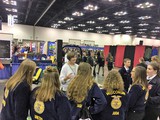
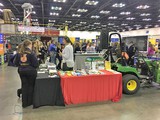 stamp their card in order for them to get a T-shirt. When getting their card stamped, each organization did a presentation about their services. Many, many T-shirts were distributed.
stamp their card in order for them to get a T-shirt. When getting their card stamped, each organization did a presentation about their services. Many, many T-shirts were distributed.
Submitted by Steve Swain
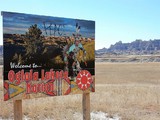 The National AgrAbility Project, in collaboration with USDA/NIFA's newly funded (September 1, 2018) AgrAbility project in South Dakota, held a two-day Intro to AgrAbility workshop on the Pine Ridge Reservation outside of Pine Ridge, SD, October 29-30. Paul Jones, National AgrAbility Project (NAP) manager, and Chuck Baldwin, NAP's special populations outreach coordinator, helped to facilitate and teach the workshop along with a number of South Dakota State University (SDSU) staff and partners. Forty-two people attended the workshop.
The National AgrAbility Project, in collaboration with USDA/NIFA's newly funded (September 1, 2018) AgrAbility project in South Dakota, held a two-day Intro to AgrAbility workshop on the Pine Ridge Reservation outside of Pine Ridge, SD, October 29-30. Paul Jones, National AgrAbility Project (NAP) manager, and Chuck Baldwin, NAP's special populations outreach coordinator, helped to facilitate and teach the workshop along with a number of South Dakota State University (SDSU) staff and partners. Forty-two people attended the workshop.
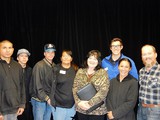 The workshop was an outgrowth of the relationship between Purdue's NAP and SDSU Extension personnel who first met at the NAP's National Training Workshop (NTW) two years ago in Knoxville, TN. Following that meeting with Extension educator Patricia Hammond (second from right next to Jason Schoch on the far right, who is SD AgrAbility's PI), who is also a member of the Oglala Lakota (Sioux) Nation, the NAP helped to bring two SDSU Extension educators and four Oglala Lakota members from the Pine Ridge reservation to the 2018 NTW. The SD team was so excited by the possibilities they saw with AgrAbility that they submitted a project proposal to NIFA and were subsequently funded in September of this year.
The workshop was an outgrowth of the relationship between Purdue's NAP and SDSU Extension personnel who first met at the NAP's National Training Workshop (NTW) two years ago in Knoxville, TN. Following that meeting with Extension educator Patricia Hammond (second from right next to Jason Schoch on the far right, who is SD AgrAbility's PI), who is also a member of the Oglala Lakota (Sioux) Nation, the NAP helped to bring two SDSU Extension educators and four Oglala Lakota members from the Pine Ridge reservation to the 2018 NTW. The SD team was so excited by the possibilities they saw with AgrAbility that they submitted a project proposal to NIFA and were subsequently funded in September of this year.
Much of the focus of this initial workshop was on mental health solutions for tribal reservation members, using subsistence agriculture as a means of healing by providing a direction in life, a job where jobs are not readily available, a self-sustaining enterprise as clients learn to produce enough food to feed themselves and their families, and an upward boost in self-worth as clients who have been dependent users become producers and contributors.
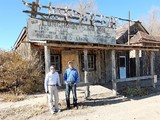 Chuck and Paul were given a short tour of the south-western corner of SD where they learned that only since the early 2000s have signs, as in the picture of Paul Jones and Jason Schoch, PI for SD AgrAbility, been changed from "No Indians Allowed" to read "Indians Allowed". Discrimination against Native Americans has taken a toll on that population.
Chuck and Paul were given a short tour of the south-western corner of SD where they learned that only since the early 2000s have signs, as in the picture of Paul Jones and Jason Schoch, PI for SD AgrAbility, been changed from "No Indians Allowed" to read "Indians Allowed". Discrimination against Native Americans has taken a toll on that population.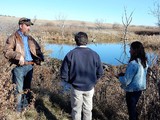 The tour of parts of the Pine Ridge Reservation was amazing in its revelation of the generational cycle of poverty and hopelessness that is so prevalent among the reservation's residents, and by the magnitude of the
The tour of parts of the Pine Ridge Reservation was amazing in its revelation of the generational cycle of poverty and hopelessness that is so prevalent among the reservation's residents, and by the magnitude of the 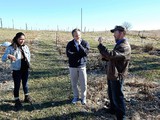 work proposed by South Dakota State University's AgrAbility team to combat that cycle. It is anticipated that if this project succeeds over the course of the next four years, it could become a model for similar projects across the more than 300 Indian reservations in the United States bringing hope to many.
work proposed by South Dakota State University's AgrAbility team to combat that cycle. It is anticipated that if this project succeeds over the course of the next four years, it could become a model for similar projects across the more than 300 Indian reservations in the United States bringing hope to many.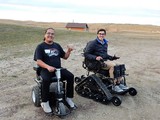
It was a privilege for the National AgrAbility Project to be instrumental in encouraging this new work among the Native American population, as well as the non-tribal farmers and ranchers, impacted by disability throughout South Dakota.
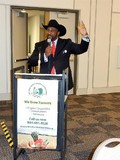 Chuck Baldwin attended the 28th Annual National Black Farmers Association (NBFA) Conference in Shreveport, Louisiana, November 2-3, 2018. Approximately 70 people were in attendance on Friday, with more that came on Saturday. Chuck shared the vision and work of Purdue's National AgrAbility Project during a session in which he was joined by Mike Lewis of the Kentucky AgrAbility Project, who shared further on AgrAbility's work with veterans impacted by disability who are currently in, or interested in, working in agriculture.
Chuck Baldwin attended the 28th Annual National Black Farmers Association (NBFA) Conference in Shreveport, Louisiana, November 2-3, 2018. Approximately 70 people were in attendance on Friday, with more that came on Saturday. Chuck shared the vision and work of Purdue's National AgrAbility Project during a session in which he was joined by Mike Lewis of the Kentucky AgrAbility Project, who shared further on AgrAbility's work with veterans impacted by disability who are currently in, or interested in, working in agriculture.
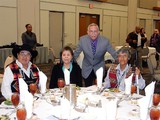 Because the NBFA conference is held in conjunction with members of the Association of American Indian Farmers, Chuck also had the opportunity to visit at length with three Native American farmers/ranchers who are interested in AgrAbility's services. Pictured with Chuck (standing) are Richard and Jolene of the Crow tribe in Montana, and on the right, Gilbert from New Mexico.
Because the NBFA conference is held in conjunction with members of the Association of American Indian Farmers, Chuck also had the opportunity to visit at length with three Native American farmers/ranchers who are interested in AgrAbility's services. Pictured with Chuck (standing) are Richard and Jolene of the Crow tribe in Montana, and on the right, Gilbert from New Mexico.
Of particular interest to Chuck at this conference was his meeting with three African American farmers from Indiana. One couple comes from the heritage of Lyles Station, near Princeton, IN, where a number of African American farmers continue to work the land. The new Smithsonian National Museum of African American History and Culture has a modest exhibit dedicated to this small farming community in southern Indiana. There, according to USA Today, "free blacks settled, cleared the land and worked their own soil prior to the Civil War, a remarkable feat considering slavery was still the law of the land in half the country, including in Kentucky just 35 miles to the south." The couple invited Chuck and AgrAbility to share at one of their next regular meetings with the African American farmers group. The other gentleman Chuck met was from the Fort Wayne, IN, area. All three seemed genuinely interested in having AgrAbility share the vision of improving quality of life for farmers and ranchers impacted by disability.
Following the NBFA conference, a Mississippi farmer with disabilities who heard Chuck and Mike speak contacted Chuck to request AgrAbility's help for his situation. Appropriate contacts and information were shared with him concerning agencies in MS that could help meet the need. This is further verification that AgrAbility is becoming increasingly known and appreciated among African American, Native American, and other underserved agricultural populations impacted by disability.
Submitted by Chuck Baldwin
